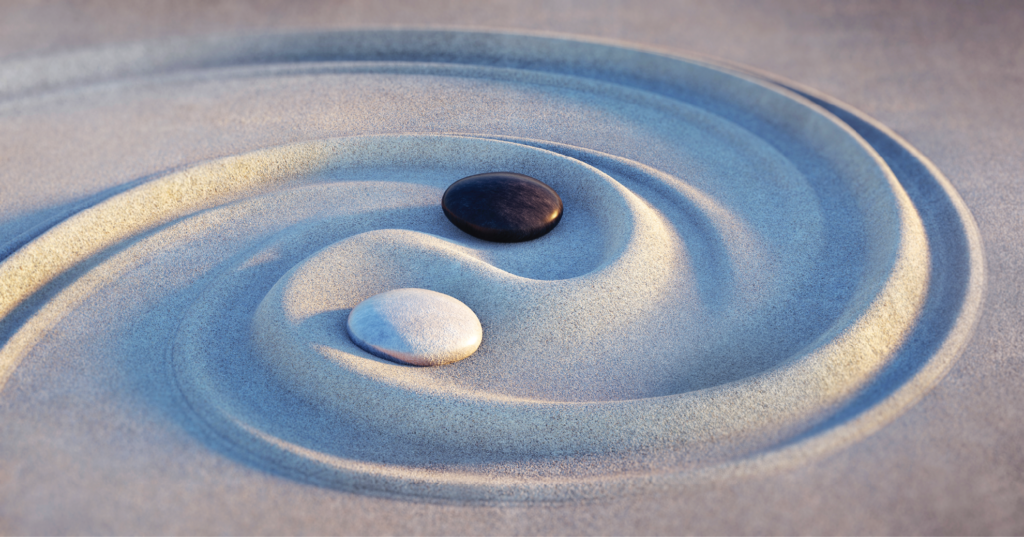I know, I know, I get it! All I do is talk about meditation, and I know that can be annoying…If you are new here and don’t know my “story,” then it seems like I have a one-track mind for thinking about nothing. I’ve found that this is what most people think meditation is, including my 18-year-old self, when I was introduced to yoga during my first week in college.
The overwhelming sense of calm that I experienced in that first yoga class has kept me coming back all these years later. But there wasn’t a big discussion around meditation; it was just a few minutes of savasana at the end of a practice. In fact, for years, I took yoga classes at various studios, and there wasn’t much focus or emphasis on meditation, that is until I went to Yoga Teacher Training.
The training hadn’t even started, and the first prerequisite reading was Jack Kornfield’s A Path With Heart. The thing I remember most about this book all these years later was the author likening meditation to training a puppy: when the puppy leaves its spot, you gently pull it back in place; similar to when your mind starts to wander, you gently pull it back to thinking of nothing. Pretty intense and intimidating stuff for someone new to meditation, but through time and practice, I learned that meditation isn’t concrete; it isn’t black or white, yes or no, right or wrong; it’s all the space and color in between.
Meditation doesn’t have to be just one thing. There are so many types and ways to meditate, and it’s all about finding what’s right for you. To me, the most important part is showing up and being consistent. Giving yourself the gift of time to sit and take care of yourself in this way, and if some days that only happens for 5 minutes, that’s okay! You showed up and took care of yourself; that is what matters.
Now, the funny thing is, I always enjoyed guiding meditations more than teaching the physical practice of yoga in a traditional class setting. I love the flow, the creativity, the journey, and the power of being the quiet observer of thoughts. When I close my eyes and feel the energy, the meditation pours out of me; when I record a meditation, I close my eyes, and I’m transported somewhere else, and not only does my mind relax, but so does my body. It’s so beautiful and powerful, and the impact on my life was so profound I wanted to share it with the world. I want to make the world kinder, one mediation at a time.
When I decided to come back to this “career,” which to me is just the openness of sharing the lifestyle I’ve been so fortunate to embrace with others, I decided to really devote myself to learning the different types of meditation and hone my craft of being of service to others through meditation. When my training program ended, I kept going, learning more and more because I was so fascinated.
When I became consistent with my practice, the way I interacted with others and was affected by the world all changed for the better. It made everything in my life better, and I wanted to do the same for others, but I also recognized how hard it can be to meditate.
The struggle was mine and personal for many years, and I wanted to help others from a place of empathy and understanding for the journey I, too, am on. Sound healing was instrumental in deepening my practice, and it brought me genuine joy to facilitate sound baths and to go and receive as a participant. But what I knew I could do was combine these modalities to provide something truly special, and that’s what I have done with my private sound baths. This all sounds well and good, right? I’m sure there is still some skepticism, curiosity, and maybe a little fear, but it’s science, brain science!
What Does Meditation Do?
Here’s where science comes in. Meditation isn’t just a feel-good practice; it has real, measurable effects on the brain and body. Let’s dive into some research-based facts:
Why Consistency Is Key
The magic of meditation doesn’t happen overnight. Like any skill, it takes time and practice to see results. Meditating consistently creates a foundation of calm and clarity that starts to ripple into other areas of your life.
Here’s why consistency matters:
What Can You Expect to Experience?
When you stick with meditation, the benefits are truly transformative. Here’s what you might notice:
For me, meditation didn’t just improve my well-being—it changed the way I interact with the world. It’s why I’m so passionate about sharing it with others. And yes, I get it—meditation can feel intimidating or even impossible at first. But trust me, it’s worth it.
Let’s Get Practical
If you’re new to meditation, here’s my advice:
And if you’re curious about combining meditation with sound healing, I’d love to share more about the deeply transformative experiences it can offer. Whatever path you choose, remember: showing up for yourself is the greatest gift you can give.
